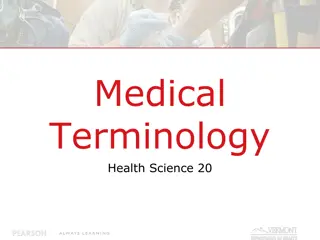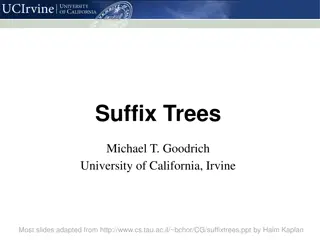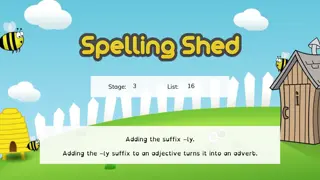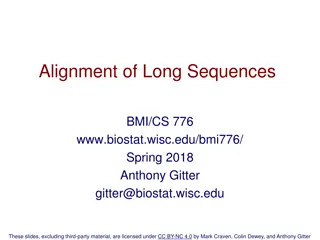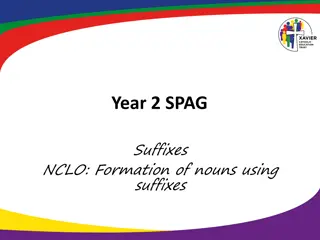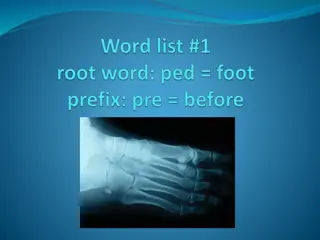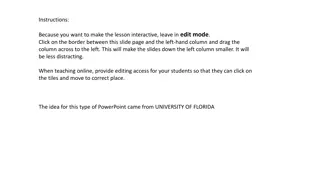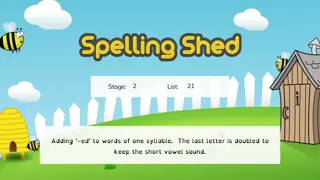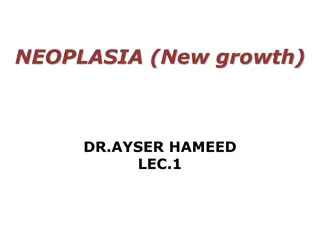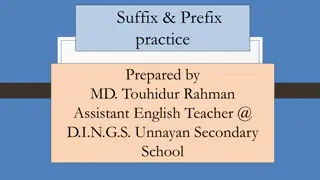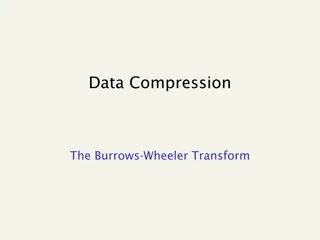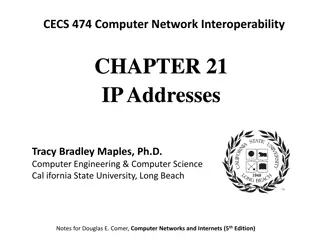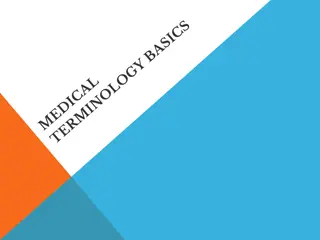Medical Terminology Health Science 20
Medical terminology is a specialized language used in healthcare to describe medical concepts concisely. It consists of prefixes, root words, and suffixes, which can be broken down to define complex terms. Utilizing proper medical terminology enhances communication among healthcare professionals and
3 views • 16 slides
Understanding Notional Parts of Speech: Adjectives and Adverbs
Exploring the notional parts of speech, this text delves into the properties and functions of adjectives and adverbs. Adjectives describe the qualities of substances, while adverbs characterize actions or qualities. Adjectives can be qualitative or relative, with degrees of comparison, while adverbs
1 views • 25 slides
Explore Suffix Rules Through Engaging Activities
Discover and practice suffix rules through interactive activities in this engaging PowerPoint presentation. Remember, apply the rules to create new words and reinforce your understanding. Join the fun learning journey with Owls and Badgers today!
0 views • 29 slides
Understanding Suffix Trees: A Comprehensive Overview
Explore the concept of suffix trees through detailed explanations, diagrams, and examples. Learn about tries, compressed tries, suffix tree construction algorithms, and more. Discover how suffix trees are used to efficiently store and search for substrings in a string.
1 views • 21 slides
Transforming Adjectives into Adverbs by Adding the -ly Suffix
Explore the process of converting adjectives into adverbs by adding the -ly suffix. Understand how this simple change alters the meaning of words and enhances sentence construction. Engage in educational activities to practice this concept effectively.
0 views • 8 slides
Large-Scale Sequence Alignment Techniques Overview
Lecture slides discuss key concepts, goals, challenges, and strategies for aligning long sequences, focusing on methods like suffix trees, dynamic programming, and pattern matching. The MUMmer system for finding maximal unique matching subsequences is explored along with examples of large-scale alig
0 views • 46 slides
Exploring Noun Formation with Suffixes - Year 2 SPAG Activities
Dive into the world of noun formation using suffixes in this engaging Year 2 SPAG lesson. Discover how suffixes transform verbs into nouns, identify job titles by adding the suffix "-er" to action words, understand emotions through "-ment" suffixes, and recognize qualities with "-ness" endings. Enga
0 views • 10 slides
Exploring Words with 'ped' - Creatures and Actions
Discover a variety of words related to creatures and actions that involve feet in this collection. From creatures like bipeds, centipedes, and millipedes to actions like pedicures and peddling, explore the meanings and images associated with the common suffix 'ped'.
0 views • 21 slides
Interactive Word Study Lesson on Ants and the Animal Kingdom
Explore the fascinating world of ants and the animal kingdom through an interactive word study lesson. Discover focus words, suffix identification, compound words, and creating new words with prefixes. Engage students in hands-on activities to enhance language skills and understanding of word format
0 views • 7 slides
Advances in Full-Text Indexing Using Suffix Arrays
Explore the evolution of full-text indexing techniques leveraging suffix arrays, from SA-hash to FBCSA, with insights on experimental results, suffix trees, and compressed indexes like CSA and FM-index. Discover efficient search strategies and data structures for pattern matching in text processing.
1 views • 28 slides
Exploring RNA-Seq Read Mapping and Quantitation
Dive into the world of RNA-Seq expression analysis through topics such as read mapping, quantitation, and the challenges faced in short-read mapping. Discover the typical parameters, design pressures, and basic ideas behind suffix tree index construction for efficient handling of large reads and dat
0 views • 19 slides
Mastering -ed Suffix in One-Syllable Words
Learn how to add the -ed suffix to one-syllable words by doubling the last letter to maintain the short vowel sound. Engage in activities to practice spelling words like patted, hummed, and clapped. Enhance your skills through exercises and unscrambling tasks. Perfect your understanding of this spel
0 views • 8 slides
Understanding Verbal Categories of Tense in English and Arabic
Verbs in English and Arabic exhibit tense distinctions with different forms denoting past and present time. English has two tenses - past and present, marked by suffixes, while Arabic has perfect and imperfect tenses marked by suffixes, prefixes, and internal vowel changes. Contrasts include English
0 views • 24 slides
Understanding Neoplasia: Characteristics and Nomenclature of Tumors
Neoplasia, or new growth, is characterized by uncoordinated growth exceeding that of normal tissues, persistent growth independent of stimuli, loss of responsiveness to growth controls, and local expansion regardless of host environment. Tumors are classified into benign and malignant categories in
0 views • 36 slides
Suffix & Prefix Practice Examples from Exam Boards
Practice adding suffixes and prefixes to root words in sentences from various exam boards to improve understanding and usage of word formations. Examples cover subjects like literature, politics, and wisdom, offering a diverse range of vocabulary to enhance language skills.
0 views • 10 slides
Understanding the Burrows-Wheeler Transform and Suffix Array
Explore the concept of the Burrows-Wheeler Transform and Suffix Array, key algorithms in data compression. Learn about the transformation process, suffix arrays, compression techniques like Bzip, and how to compute the BWT. Discover the significant role these methods play in efficient data compressi
0 views • 10 slides
Unpacking Identities: Hispanic, Latinx, and Ch/Xicanx
Delve into the complexities of Hispanic, Latinx, Chicano/a, and Xicano/a identities through the insightful exploration of language's power in serving marginalized communities like youth. Understand the impact of terms, the inclusivity offered by the "X" suffix, and the historical context behind Hisp
0 views • 16 slides
Common Writing Errors Every Student Should Avoid
Common writing errors can negatively impact your academic work. This article highlights 30 errors, such as misuse of the suffix "-wise," confusion between "type" and "kind," redundant phrases, and incorrect usage of "different" and "due to." It also covers distinctions between "disinterested" and "u
0 views • 13 slides
Understanding Present Continuous Tense and Verb Forms
The content discusses the Present Continuous Tense, consisting of the verb "be" and the suffix "-ing", its uses in describing ongoing actions at the moment of speaking, planned future events, temporary actions or habits, and expressing irritation. It also covers verb forms with examples and rules fo
0 views • 22 slides
Understanding IP Addressing in Computer Networks
IP addressing provides a seamless network for users by abstracting and providing a uniform addressing scheme used by higher-layer protocols and applications. IP addresses identify connections rather than specific computers, with IPv4 using 32-bit integers and IPv6 using 128-bit addresses. The divisi
0 views • 19 slides
Understanding the Structure of Medical Terms
Medical terms consist of word roots, prefixes, suffixes, and combining vowels rooted in Greek and Latin. Word roots provide the core meaning, prefixes modify it, suffixes indicate conditions, and combining vowels connect roots. Recognizing these elements aids in deciphering complex medical terminolo
0 views • 10 slides
